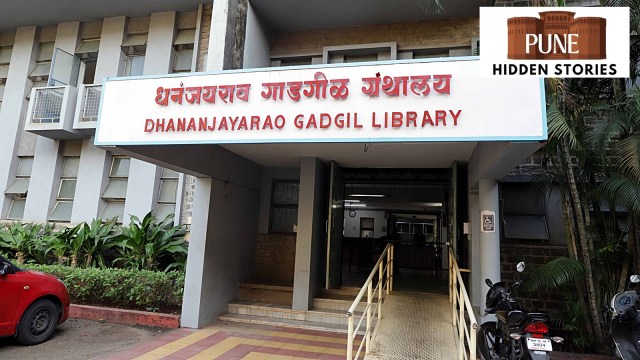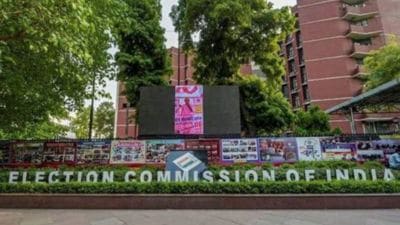Click here to join Express Pune WhatsApp channel and get a curated list of our stories
With vast collection of books and rare records, 118-year-old Dhananjayrao Gadgil Library in Pune still holds its own
Free and open public access has been one of the basic features of the Pune library which was founded by the Servants of India Society
 Dhananjayarao Gadgil Library established in 1905 at Gokhale Institute Of Politics & Economics. (Express Photo by Pavan Khengre)
Dhananjayarao Gadgil Library established in 1905 at Gokhale Institute Of Politics & Economics. (Express Photo by Pavan Khengre)Back when census data, annual government budgets and gazettes, United Nations reports and research journals were not digitised or available on the internet, it was the Dhananjayrao Gadgil Library on the campus of the Gokhale Institute of Politics and Economics that proved to be a treasure trove for researchers, students and the public in Pune.
Well into the digital age, the 118-year-old library still holds the distinction with a collection of 35,000 books, rare documents, census records, surveys, research material and national and international government committee reports that are freely available to all on their digital library.
 Free and open public access has been one of the library’s basic features, right from the time it was founded by the Servants of India Society as a volunteer-run library in 1905 . (Express Photo by Pavan Khengre)
Free and open public access has been one of the library’s basic features, right from the time it was founded by the Servants of India Society as a volunteer-run library in 1905 . (Express Photo by Pavan Khengre)
Digitisation began in 2009
“To improve the accessibility to books in keeping with the times, the digitisation process of our books was started in 2009,” says the librarian Nanaji Shewale. “This library has been one of great repute. From government committee reports to gazettes, census records as old as the first in 1872 to documents and research from foreign institutes and banks as well as a rare set of the works of Machiavelli published in 1608, the library features a collection like no other,” he explains.
“Starting 1945, it was one of the only institutes in the country which would regularly receive the latest publications of the various bodies of the United Nations,” Shewale adds. Hardbound versions of these and more, including research journals, financial newspapers like ‘The Financial Express’ and ‘Economic Times’ from the 1960s onwards, PhD dissertations and theses written at the institute are stored as part of the library’s 2,85,000-strong collection.
Free and open public access has been one of its basic features, right from the time it was founded by the Servants of India Society as a volunteer-run library in 1905.
A casual-member fee of Rs 20 is charged for a day-long visit to the library which stays open from 9.30 am to 8 pm, six days of the week. A yearly membership is open to the public for Rs 700 and a lifetime membership for Rs 7,000. Institutional access is also granted at nominal prices. Anyone who visits the library also gets free access to online resources, including journals like JStor, on their own device through the library Wi-Fi.
 Because it grew in proximity to the Gokhale Institute, the library mostly has an extensive collection of economic literature .( Express Photo by Pavan Khengre)
Because it grew in proximity to the Gokhale Institute, the library mostly has an extensive collection of economic literature .( Express Photo by Pavan Khengre)
Gokhale’s vision
Founded as the Servants of India Society (SIS) Library on the top floor of a building right opposite the residence of SIS founder and nationalist leader Gopal Krishna Gokhale, the library is 25 years older than the Gokhale Institute which was started in 1930. “Gokhale’s vision was that before we get Independence, we should be literate enough to handle our country well,” Shewale says.
Today, the residence as well as the SIS building are within the campus. In 1965, the library was shifted to a new three-storey building which has five levels, adjacent to the SIS office. It was then that it was renamed after the renowned economist Dhananjay Ramchandra Gadgil.
Wide collection of economic literature
Because it grew in proximity to the Gokhale Institute, the library mostly has an extensive collection of economic literature. From the state of the Indian economy in times of Ashoka or Akbar to pre-war European economies as well as economic turbulences in the African continent or political economies of South American nations, the collection spans history and geography. There are also small but niche collections of politics, sociology, gender, history and linguistics.
 With over 500 procurements every year and an increasing digital collection, the library has been able to hold as much relevance for knowledge-seekers in the present as it did in the past. (Express Photo by Pavan Khengre)
With over 500 procurements every year and an increasing digital collection, the library has been able to hold as much relevance for knowledge-seekers in the present as it did in the past. (Express Photo by Pavan Khengre)
Digitisation broadened the horizons of the library. “As our digital collection grew, people approached us to add the archived publications they have. So we also have some obscure Marathi periodicals and old, short-lived newspapers,” Shewale says. “Earlier people would travel from all over Maharashtra and often farther to visit our library, and today people from all over the world are accessing our digital content.”
With over 500 procurements every year and an increasing digital collection, the library has been able to hold as much relevance for knowledge-seekers in the present as it did in the past.
Click here to join Express Pune WhatsApp channel and get a curated list of our stories












